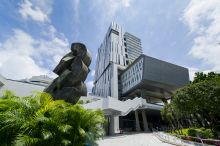The Master of Science in Biostatistics aims to train the next generation of biostatisticians through an innovative curriculum and equip them with the necessary analytical, leadership and communication skills to meet the challenges of a data-intense era. It will help foster the development of novel statistical theory and the application of state-of-the-art data analytical solutions for problems in public health, veterinary epidemiology and the biomedical sciences.
Comprehensive training in the principles and applications of statistics in biological science and public health will be provided. Students are trained in Biostatistics using One Health approach to enhance their knowledge, abilities and professional capabilities to solve the interdisciplinary health problems posed by emerging medical and public health issues.
Graduates can pursue careers, for example, in biomedical and public health studies in government, biotechnology companies and national/international research institutions. The programme also provides the necessary academic preparation for those who wish to pursue PhD-level training in biostatistics at a later date.
Programme Intended Learning Outcomes (PILOs)
Upon successful completion of this Programme, students should be able to:
- Acquire a thorough understanding of the fundamental statistical techniques and models needed for analyzing biomedical data;
- Acquire the ability to carry out appropriate statistical analyses on real biomedical data sets using statistical software;
- Advise on the design of biomedical studies (in terms of sample size, power, models and feasibility);
- Advise on novel solutions for problems associated with the application of biostatistical methods to problems in public health;
- Communicate effectively and work closely with people from diverse educational, professional backgrounds and experience; and
- Apply the One Health approach along with biostatistical and scientific skills to address public health issues and/or undertake research.






